Revolution is a force to be reckoned with. It's a sudden and radical change that shakes the very foundations of society, challenging and overthrowing existing political, economic, or social orders. These transformative events have left an indelible mark on the world, inspiring generations of activists and shaping the modern world we live in today.
💡Table of Content
Revolution arises from deep-rooted grievances and discontent within society. When people feel marginalized, silenced, or subjected to oppressive systems, the collective frustration and desire for change become powerful catalysts for revolutionary movements. These movements demand a more equitable and just society, challenging and overthrowing existing power structures.
Throughout history, there have been several revolutions that have profoundly reshaped the course of nations, challenged prevailing power structures, and propelled societies towards new eras of political, social, and economic change. From the American Revolution to the French Revolution, from the Russian Revolution to the Arab Spring, these revolutions have challenged the status quo, promoted social justice, and redefined the course of human history.
As we reflect on the past, we must recognize the enduring power of revolutions to reshape our future. While revolutions have sometimes resulted in turmoil and uncertainty, their impact has been instrumental in shaping the world we live in today.
As previously stated, there have been numerous significant developments throughout history. It is plausible that we may have overlooked some noteworthy revolutions despite our efforts to incorporate the most prominent ones. If you believe that any additional revolutions warrant inclusion in this list, kindly inform us in the comments section.
So scroll down to explore the list of "The Top 10 Most Considerable Revolutions in History "
1. The French Revolution
Cause of this Revolution
The French Revolution was a powder keg of socioeconomic factors and political discontent that finally exploded. The lower classes were weighed down by deep-rooted inequality and a rigid social structure, while the nobility and clergy enjoyed vast privileges and exemptions. High taxes, food shortages, and widespread poverty only added fuel to the fire of resentment towards the monarchy and aristocracy. Enlightenment ideas that championed individual rights, liberty, and equality challenged the traditional authority of the monarchy. The combination of these ideas and economic hardships created a volatile environment that was ripe for revolutionary change.
Important Events
The French Revolution was a tumultuous period filled with significant events that shaped the course of history. Here are some of the important events of the French Revolution:
- Estates-General (1789)
- Storming of the Bastille (July 14, 1789)
- Declaration of the Rights of Man and of the Citizen (August 26, 1789)
- Women's March on Versailles (October 5-6, 1789)
- Execution of Louis XVI (January 21, 1793)
- Reign of Terror (1793-1794)
- Rise of Napoleon Bonaparte (1799)
Impact on the World
The French Revolution's impact on the world was nothing short of profound and far-reaching. It served as a catalyst for the spread of revolutionary ideas, inspiring movements for independence and democratic reforms across Europe and the Americas. The revolution's emphasis on individual rights, equality, and the principles of liberty and fraternity reshaped political systems, challenged the authority of monarchies, and laid the foundation for modern concepts of human rights and democracy. It sparked a wave of social and political transformation, leaving an indelible mark on the course of history and shaping the development of nations and societies around the globe.
Rank
The French Revolution ranks at the top in terms of the most considerable revolutions in history.
2. The Russian Revolution
Cause of this Revolution
The Russian Revolution of 1917 was a momentous event, driven by a confluence of political, economic, and social factors. The autocratic rule of Tsar Nicholas II had long been a source of discontent, and the country's participation in World War I only exacerbated the already dire economic conditions. The working class and peasants suffered greatly, with food shortages and inflation causing widespread hardship. The immense social inequality and oppressive conditions of the proletariat fueled revolutionary sentiments, which were further stoked by the influence of Marxist ideologies and the Bolshevik Party, led by the visionary Vladimir Lenin. The culmination of these factors created a volatile environment that ultimately led to the downfall of the monarchy and the establishment of a socialist state.
Important Events
The Russian Revolution, which occurred in 1917, was a complex series of events that unfolded over the year. Here are some of the key events during this transformative period:
- February Revolution (March 1917)
- April Theses (April 1917)
- October Revolution (October 1917)
- July Days (July 1917)
- Treaty of Brest-Litovsk (March 1918)
- Execution of the Romanov Family (July 1918)
- Red Terror (1918-1922)
- New Economic Policy (NEP) (1921)
- Formation of the Soviet Union (1922)
Impact on the world
It wasn't just a political upheaval, but a seismic shift in ideology and socio-economic systems. The birth of the Soviet Union as the first socialist state inspired revolutionary movements and leftist ideologies worldwide. The revolution's focus on workers' rights, land redistribution, and the overthrow of oppressive regimes ignited hope and rebellion among oppressed classes in other countries. It also fueled the rise of communist parties and socialist movements across Europe, Asia, and Latin America. The Russian Revolution fundamentally reshaped the geopolitical landscape, leading to the emergence of the Soviet Union as a major global power and sparking ideological tensions with capitalist nations. Its influence extended beyond politics, shaping art, literature, and cultural movements such as socialist realism.
Rank
The Russian Revolution ranks second in terms of the most considerable revolutions in history.
3. The American Revolution
Cause of this Revolution
The American Revolution was a fiery, eight-year battle that was fueled by a potent mix of political, economic, and ideological factors. The colonists in British North America had forged a unique identity, one that was separate from their British counterparts. They believed in individual rights, representative government, and the rule of law. However, tensions boiled over when the British government imposed taxes on the colonists without their consent. The Stamp Act of 1765 and the Tea Act of 1773 were particularly galling, leading to acts of resistance like the Boston Tea Party. The British government's attempts to maintain strict control over the colonies only served to further alienate the American people.
Important Events
Here are some of the important events of the American Revolution:
- Battles of Lexington and Concord (April 19, 1775)
- Battle of Saratoga (September 19 to October 7, 1777)
- Winter at Valley Forge (December 1777 to June 1778)
- Battle of Yorktown (September 28 to October 19, 1781)
- Treaty of Paris (1783)
- Battle of Bunker Hill (June 17, 1775)
- Boston Tea Party (December 16, 1773)
- Crossing of the Delaware River (December 25-26, 1776)
- Siege of Charleston (March 29 to May 12, 1780)
Impact on the World
The American Revolution was a game-changer that shook the world to its core. It wasn't just about the thirteen colonies breaking free from British rule; it was about the birth of a new era of freedom, democracy, and equality. The revolutionary ideals of liberty, self-determination, and representative government spread like wildfire, inspiring oppressed peoples across the globe to rise up and fight for their rights. The American Revolution proved that anything was possible, that even the mightiest colonial power could be overthrown, and that democracy was the way forward. Its impact was felt far beyond North America, igniting movements for independence and democratic reforms in Latin America, Europe, and beyond.
Rank
The American Revolution ranks third in terms of the most considerable revolutions in history.
4. The Haitian Revolution
Cause of this Revolution
The Haitian Revolution was a pivotal moment in history, spanning from 1791 to 1804. It was a complex and multifaceted event, driven by a range of social, political, and economic factors. At its core was the brutal system of slavery that existed in Saint-Domingue, which is now known as Haiti. Enslaved Africans and their descendants were subjected to unimaginable cruelty and exploitation, and they were determined to fight for their freedom, equality, and human rights. The revolution was also fueled by a desire for independence from colonial rule and a quest for self-determination. These tensions were further exacerbated by the growing divide between wealthy plantation owners and the enslaved workforce.
Important Events
Here are some of the important events of the Haitian Revolution:
- Slave Rebellion Begins (August 21, 1791)
- Battle of Vertières (November 18, 1803)
- Toussaint Louverture's Capture (June 7, 1802)
- Declaration of Independence (January 1, 1804)
Impact on the World
It marked the first successful slave revolt, leading to the abolition of slavery and the establishment of the independent Republic of Haiti. The revolution's significance extended beyond the island, inspiring enslaved individuals globally with the prospect of liberation and equality. It challenged the existing racial hierarchy and colonial rule, instilling fear in slaveholders and colonial powers throughout the Americas. The Haitian Revolution demonstrated the resilience and determination of enslaved Africans and people of African descent in their pursuit of freedom and self-determination. It conveyed a powerful message about the transformative potential of collective action, inspiring future anti-colonial and anti-slavery movements in the 19th and 20th centuries.
Rank
The Haitian Revolution ranks fourth in terms of the most considerable revolutions in history.
5. The Glorious Revolution
Cause of this Revolution
The Glorious Revolution was a significant turning point in English history, signifying the conclusion of absolute monarchy and the dawn of a constitutional monarchy. The catalyst for this momentous event was the unpopular reign of King James II, who was perceived as a danger to Protestantism and individual freedoms. His efforts to advance Catholicism and quell opposition sparked widespread resistance, culminating in the arrival of William of Orange and his army in 1688. The ensuing peaceful revolution resulted in James II fleeing to France and William and Mary assuming the throne, ushering in a new era of parliamentary authority.
Important Events
Here are some of the critical events associated with the Glorious Revolution:
- 1660: The Restoration
- November 5, 1688: William of Orange's Landing
- June 30, 1688: Invitation to William of Orange
- June 10, 1688: Birth of James Francis Edward Stuart
- 1687: Declaration of Indulgence
- 1685: Accession of James II
- 1679-1681: Exclusion Crisis
Impact on the World
The Glorious Revolution of 1688 was a momentous event that had a profound impact on the world. It marked the end of absolute monarchy in England and established a constitutional monarchy, setting a precedent for other countries to follow. The ripple effect of this revolution inspired movements towards democracy and constitutionalism, paving the way for the Enlightenment and the Age of Reason. These intellectual movements brought about significant changes in politics, philosophy, and science. Furthermore, the Glorious Revolution had a profound impact on the development of the British Empire, providing greater political stability and economic growth.
Rank
The Glorious Revolution ranks fifth in terms of the most considerable revolutions in history.
6. The Young Turk Revolution
Cause of this Revolution
The Young Turk Revolution of 1908 was a momentous event that was brought about by a confluence of political, social, and economic factors that had been brewing in the late Ottoman Empire. The autocratic rule of Sultan Abdulhamid II had stifled political freedoms and curtailed the power of the parliament, leading to widespread discontent among the populace. The call for constitutional reforms and the reinstatement of a parliamentary system became a clarion call for various opposition groups. The empire was also grappling with economic decline and military defeats, which further exacerbated the frustrations of different segments of society. The Young Turks, a group of visionary intellectuals and military officers, emerged as a formidable force advocating for change and modernization. They sought to establish a constitutional government, promote equality, and address the empire's pressing issues with a sense of urgency and purpose.
Important Events
The Young Turk Revolution, also known as the Committee of Union and Progress (CUP) Revolution, was a series of events in the early 20th century that led to the overthrow of the autocratic rule of Sultan Abdulhamid II and marked a significant shift in the governance of the Ottoman Empire. Here are some important events of the Young Turk Revolution:
- Balkan Wars (1912-1913)
- Dissolution of the CUP government (1912)
- Elections and the First Parliament (1908)
- Restoration of the Ottoman Constitution (1908)
- Sultan Abdulhamid II's capitulation
- 1908 Revolution
Impact on the world
The Young Turk Revolution of 1908 had a profound impact on the Ottoman Empire and the wider region. Spearheaded by a group of progressive intellectuals and military officers, the revolution sought to modernize and reform the empire. Its success led to the reinstatement of the Ottoman constitution and the establishment of a more liberal and secular government. The revolution marked a significant departure from the autocratic rule of the Sultans and ushered in a period of constitutional monarchy. Moreover, it inspired nationalist movements and fueled aspirations for self-determination among diverse ethnic groups within the empire. The Young Turk Revolution remains a pivotal moment in the history of the region.
Rank
The Young Turk Revolution ranks sixth in terms of the most considerable revolutions in history.
7. The Chinese Revolution
Cause of this Revolution
The Chinese Revolution was a momentous event that shook the world and gave birth to the People's Republic of China in 1949. It was a complex and multifaceted movement that had deep-rooted socio-economic and political causes. China had been grappling with internal unrest, widespread poverty, and foreign imperialism for decades. The Qing Dynasty's rule was marked by corruption, incompetence, and a failure to address the country's pressing problems. The influence and control of foreign powers further fueled popular discontent. Revolutionary ideas, such as Marxism and nationalism, inspired various groups and intellectuals to seek radical change. The Chinese Revolution was a turning point in history that changed the course of China forever.
Important Events
These are some of the important events linked with the Chinese Revolution:-
- Chinese Civil War (1945-1949)
- Second Sino-Japanese War (1937-1945)
- Long March (1934-1935)
- Chinese Communist Party (CCP) Founding (1921)
- Shanghai Massacre (1927)
- Northern Expedition (1926-1927)
- Xinhai Revolution (1911)
- May Fourth Movement (1919)
Impact on the World
The Chinese Revolution, led by Mao Zedong, was a pivotal moment in history that transformed China from an agrarian society to a socialist state. The establishment of the People's Republic of China brought about significant changes in geopolitics and international relations. The impact of China's shift towards socialism and its advocacy for anti-imperialism and self-reliance inspired revolutionary movements and socialist ideologies across Asia, Africa, and Latin America during the Cold War era. However, this transformation also brought about challenges and shifts in economic and political dynamics on a global scale. It is important to recognize the profound impact this revolution had on the world and the people affected by it.
Rank
The Chinese Revolution ranks seventh in terms of the most considerable revolutions in history.
8. The Taiping Revolution
Cause of this Revolution
The Taiping Revolution, a pivotal event in Chinese history, was the culmination of a multifaceted interplay of social, economic, and political factors. During the Qing Dynasty, widespread discontent and social unrest fueled the revolution. The peasantry was plagued by economic hardships such as poverty, famine, and overpopulation, while the Qing government was riddled with corruption, inefficiency, and incompetence. The imposition of foreign influence and the spread of Christianity further agitated traditional Chinese society. These factors, coupled with the charismatic leadership of Hong Xiuquan, who declared himself the younger brother of Jesus Christ, sparked a fervent rebellion aimed at toppling the Qing Dynasty and establishing a utopian society founded on egalitarian principles.
Important Events
These are some of the considerable events connected with the Taiping Revolution:-
- Hong Xiuquan's Revelation (1837)
- Capture of Nanjing (1853)
- Expansion of the Rebellion (1853-1856)
- Formation of the Taiping Heavenly Kingdom (1851)
- Siege of Shanghai (1860)
- Internal Conflicts and Decline (1860s)
- Qing Dynasty Counteroffensive (1860s)
Impact on the World
The Taiping Revolution, a significant event in Chinese history, left an indelible mark on the international stage. The Western powers, keen on exploiting the tumultuous situation in China, were drawn to the rebellion. Their ulterior motives were to gain economic and political advantages. The uprising, in turn, indirectly led to the erosion of Chinese sovereignty and the rise of foreign influence and imperialism in the country. The conflict caused widespread devastation, disrupted trade, and resulted in the loss of millions of lives, making it one of the deadliest conflicts in history.
Rank
The Taiping Revolution ranks eighth in terms of the most considerable revolutions in history.
9. The Cuban Revolution
Cause of this Revolution
The genesis of the revolution was rooted in the profound dissatisfaction with the tyrannical rule of the Cuban despot, Fulgencio Batista, whose regime was marked by corruption, inequality, and the suppression of fundamental liberties. Spearheaded by the indomitable Fidel Castro and his intrepid guerrilla forces, the revolution aimed to depose Batista's government and establish a socialist system in Cuba. The triumph of the revolution had a profound impact on the global stage, serving as a beacon of defiance against imperialism and inspiring other revolutionary movements throughout Latin America, Africa, and beyond. The Cuban Revolution also altered the geopolitical landscape of the Cold War, as Castro aligned Cuba with the Soviet Union, exacerbating tensions between the United States and the Soviet Union.
Important Events
Here are some important events associated with the Cuban Revolution:
- Moncada Barracks Attack (July 26, 1953)
- Trial and Manifesto (October 16, 1953)
- Granma Expedition (December 2, 1956)
- Battle of Santa Clara (December 28, 1958)
- Batista's Resignation (January 1, 1959)
- Fidel Castro's Entrance to Havana (January 8, 1959)
- Agrarian Reform Law (May 17, 1959)
- Cuban Missile Crisis (October 1962)
Impact on the world
The Cuban Revolution was a transformative event that had a profound impact not only on Cuba but also on the global stage. Led by Fidel Castro and his rebel forces, the revolution challenged the established order and brought about significant social, economic, and political changes. It served as a beacon of hope for those fighting against imperialism and sparked ideological divisions during the Cold War. The Castro government implemented land reforms, nationalized industries, and prioritized education, healthcare, and literacy. This socialist model and defiance of U.S. influence inspired leftist movements and revolutions across Latin America and Africa. However, it also resulted in strained relations with the U.S., leading to the ongoing embargo on Cuba.
Rank
The Cuban Revolution ranks ninth in terms of the most considerable revolutions in history.
10. The Iranian Revolution
Cause of this Revolution
The Iranian Revolution of 1979 was a pivotal moment in history, driven by a powerful desire for change and a deep-seated frustration with the oppressive regime of Mohammad Reza Shah Pahlavi. The Shah's autocratic rule stifled dissent and favored a privileged elite, creating stark socioeconomic disparities that left many Iranians struggling to survive. The Shah's pro-Western stance only fueled resentment among nationalist and religious groups, who saw the monarchy as a puppet of foreign powers. The revolution was a triumph of the people, who rose up in protest and forced the Shah into exile, paving the way for the establishment of the Islamic Republic of Iran.
Important Events
Here are some of the critical events associated with the Iranian Revolution:-
- Black Friday (September 8, 1978)
- General Strike (October 1978)
- Return of Ayatollah Khomeini (February 1, 1979)
- Islamic Republic Referendum (April 1, 1979)
- Fall of the Pahlavi Regime (January 16, 1979)
- Takeover of the U.S. Embassy (November 4, 1979)
- Approval of the Constitution (December 3, 1979)
Impact on the world
The Iranian Revolution of 1979 was a seismic shift that rocked the world to its core. The fall of the Western-backed monarchy and the rise of an Islamic Republic under Ayatollah Ruhollah Khomeini transformed the political and religious landscape of the Middle East. The revolution sparked a wave of Islamist movements and uprisings in other Muslim-majority countries, igniting a flame that still burns bright today. The international fallout was equally dramatic, with Iran's relationship with the West, particularly the United States, strained to breaking point. The infamous hostage crisis, where American diplomats were held captive for 444 days, remains a stark reminder of the revolution's impact.
Rank
The Iranian Revolution ranks tenth in terms of the most considerable revolutions in history.





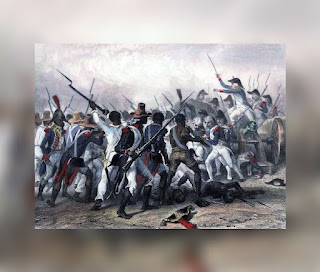
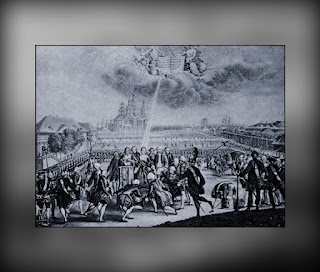
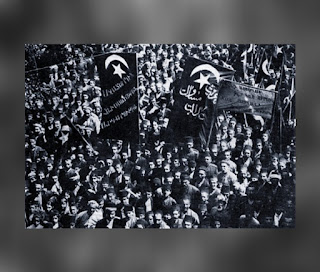
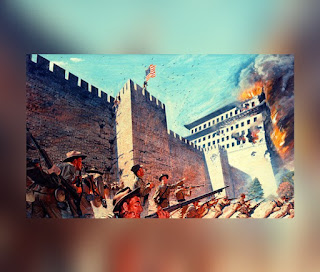
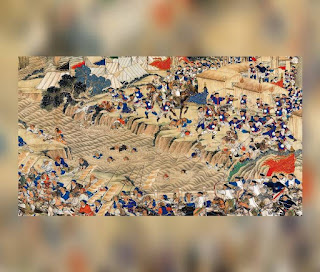
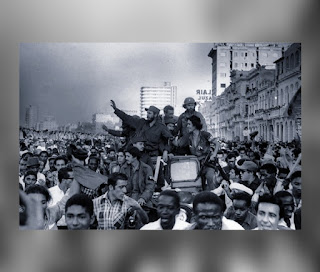

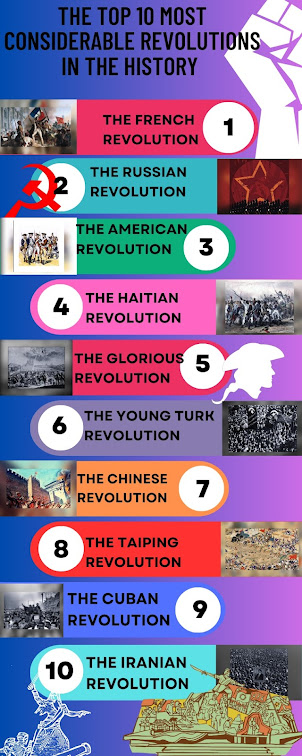

0 Comments